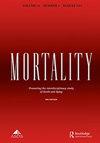死亡从来不是美丽的,但也有美丽的时刻:就 "美好的死亡 "这一主题对受影响者进行定性访谈
IF 1
0 HUMANITIES, MULTIDISCIPLINARY
引用次数: 0
摘要
摘要 "美好死亡 "的概念已被广泛考虑。然而,受影响者的观点却没有得到足够的重视。在我们的实证研究中,我们对 32 位面临死亡的人进行了访谈,这些人要么身患绝症,要么年事已高,要么是失去亲人的照顾者。研究结果表明,对这些人来说,死亡不仅是一个生理过程,也是一个心理、社会和精神过程。从受影响者的角度来看,死亡从来都不是一件美好的事情,尤其是因为与之相关的痛苦和折磨。与此同时,面临死亡的人也会经历美丽的时刻。在他们讲述的这些美丽时刻的故事中,这种美来自于一种高尚的情感--道德情感--而不是任何美学上的美。我们的结论是,良好的临终关怀能够促成美丽的时刻,并为受影响者创造反思的空间,让他们表达美对他们的意义。我们表明,公共讨论与受影响者的观点有很大不同,因此需要做出更多努力,让他们发出自己的声音。本文章由计算机程序翻译,如有差异,请以英文原文为准。
Dying is never beautiful, but there are beautiful moments: qualitative interviews with those affected on the subject of ‘good dying’
ABSTRACT The concept of the good death has been widely considered. However, the perspectives of those affected have not received sufficient attention. In our empirical study, we conducted interviews with 32 people who were confronted with dying; these people were either terminally ill, elderly or else were bereaved carers. The findings show that for this group of people, dying is not just a physical process, but also a psychological, social and spiritual one. From the perspective of those affected, dying is never beautiful, in particular because of the associated pain and suffering. At the same time, people confronted with dying do experience beautiful moments. In the stories they tell of these beautiful moments, it is a beauty emanating from a sense of elevated emotion – of moral emotion – rather than any aesthetic beauty. We conclude that good care of the dying enables beautiful moments and creates reflective spaces for those affected to express what beauty means to them. We show that the public discourse differs significantly from the perspective of those affected and more efforts need to be made to include their voices.
求助全文
通过发布文献求助,成功后即可免费获取论文全文。
去求助
来源期刊

Mortality
Arts and Humanities-Religious Studies
CiteScore
1.80
自引率
12.50%
发文量
42
期刊介绍:
A foremost international, interdisciplinary journal that has relevance both for academics and professionals concerned with human mortality. Mortality is essential reading for those in the field of death studies and in a range of disciplines, including anthropology, art, classics, history, literature, medicine, music, socio-legal studies, social policy, sociology, philosophy, psychology and religious studies. The journal is also of special interest and relevance for those professionally or voluntarily engaged in the health and caring professions, in bereavement counselling, the funeral industries, and in central and local government.
 求助内容:
求助内容: 应助结果提醒方式:
应助结果提醒方式:


